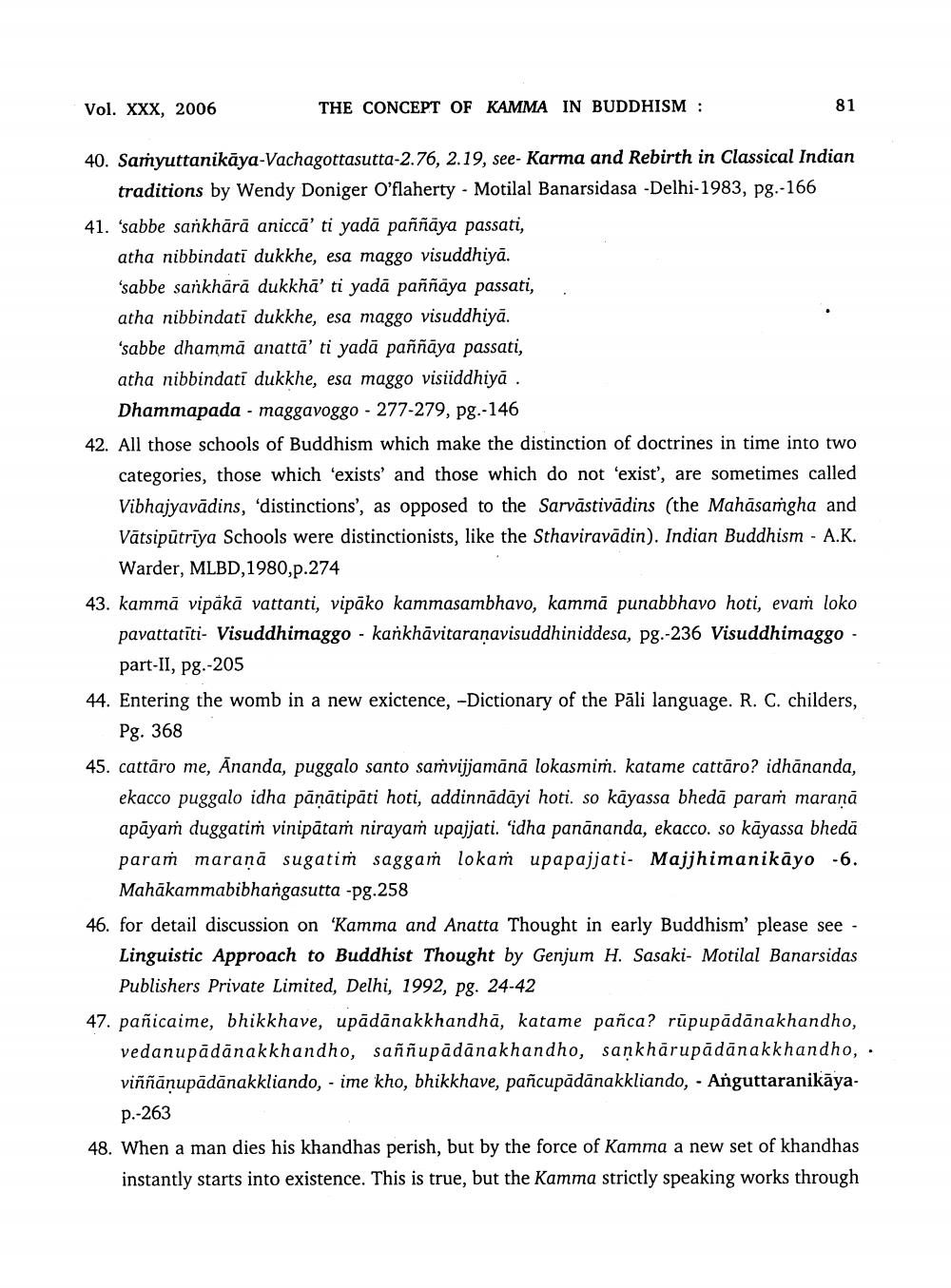________________
Vol. XXX, 2006
THE CONCEPT OF KAMMA IN BUDDHISM :
81
40. Samyuttanikāya-Vachagottasutta-2.76, 2.19, see- Karma and Rebirth in Classical Indian
traditions by Wendy Doniger O'flaherty - Motilal Banarsidasa - Delhi-1983, pg.-166 41. 'sabbe sankhārā aniccā' ti yadā paññāya passati,
atha nibbindati dukkhe, esa maggo visuddhiyā. 'sabbe sarkhārā dukkhā' ti yadā paññāya passati, atha nibbindati dukkhe, esa maggo visuddhiyā. 'sabbe dhammā anattā' ti yadā paññāya passati, atha nibbindati dukkhe, esa maggo visiiddhiya .
Dhammapada - maggavoggo - 277-279, pg.-146 42. All those schools of Buddhism which make the distinction of doctrines in time into two
categories, those which 'exists' and those which do not 'exist', are sometimes called Vibhajyavādins, 'distinctions', as opposed to the Sarvāstivādins (the Mahāsamgha and Vätsipūtriya Schools were distinctionists, like the Sthaviravādin). Indian Buddhism - A.K.
Warder, MLBD, 1980,p.274 43. kammā vipäkā vattanti, vipāko kammasambhavo, kammā punabbhavo hoti, evam loko
pavattatīti- Visuddhimaggo - kankhävitaranavisuddhiniddesa, pg.-236 Visuddhimaggo -
part-II, Pg.-205 44. Entering the womb in a new exictence, -Dictionary of the Pāli language. R. C. childers,
Pg. 368 45. cattāro me, Ānanda, puggalo santo samvijjamānā lokasmim. katame cattāro? idhānanda,
ekacco puggalo idha pāņātipāti hoti, addinnādāyi hoti. so kāyassa bhedā paraṁ maraņā apāyam duggatim vinipātam nirayam upajjati. 'idha panānanda, ekacco. so kāyassa bhedā paras maranā sugatim sagga lokam upapajjati. Majjhimanikāyo -6.
Mahākammabibhangasutta-pg.258 46. for detail discussion on 'Kamma and Anatta Thought in early Buddhism' please see -
Linguistic Approach to Buddhist Thought by Genjum H. Sasaki- Motilal Banarsidas
Publishers Private Limited, Delhi, 1992, pg. 24-42 47. pañicaime, bhikkhave, upädänakkhandhā, katame pañca? rūpupādānakhandho,
vedanupādānakkhandho, saññupādānakhandho, sankhārupādānakkhandho, · viññãnupadānakkliando, - ime kho, bhikkhave, pañcupadānakkliando, • Anguttaranikaya
p.-263 48. When a man dies his khandhas perish, but by the force of Kamma a new set of khandhas
instantly starts into existence. This is true, but the Kamma strictly speaking works through




